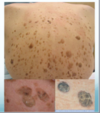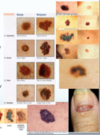Derm Flashcards
What is scabies?
Scabies (“the itch”) is an infestation of the skin by the mite Sarcoptes scabiei that results in an intensely pruritic eruption with a characteristic distribution pattern.
How is scabies typically distributed?
- sides and webs of the fingers,
- flexor aspects of the wrists
- extensor aspects of the elbows, anterior and posterior axillary folds, the skin immediately adjacent to the nipples (especially in women), the periumbilical areas, waist
- male genitalia (scrotum, penile shaft, and glans), the extensor surface of the knees, the lower half of the buttocks and adjacent thighs, and the lateral and posterior aspects of the feet.
- The back is relatively free of involvement, and the head is spared except in very young children. Rarely, may be localized to a single area

Clinical characteristics of scabies
- **itching. often severe and usually worse at night.
- * small, erythematous, nondescript papule, often excoriated and tipped with hemorrhagic crusts (not dramatic lesion and not always easy to see.
- Burrow is pathognomonic. thin, grayish, reddish, or brownish line that is 2 to 15 mm long. (Often absent or obscured by excoriation or secondary infection)
- * Miniature wheals, vesicles, pustules, and rarely bullae may also be present.
- * Magnify the lesion – will see burrow, seripigenous lesion, can use india ink dye test (usually in derm)
- Crusted - suggests immunodeficiency (look for RFs for HIV)
- * Can be nodular
Why does scabies itch?
- * delayed type-IV hypersensitivity reaction to the mite, mite feces, and mite eggs
- * 3 to 6 weeks after primary infestation
- * UNLESS previously infested with scabies: one to three days after reinfestation, presumably because of prior sensitization of the patient’s immune system
Treatment for scabies
Ivermectin oral or Permethrin topical
What is post scabetic dermatitis?
No longer infected but still having immune response to scabies. Will go away as skin sheds.
Treatment of postscabetic dermatitis
Comfort care
Atarax, topical steroids or other anti-itch creams
How crazy do patients have to get about washing/bagging all their linens/clothes/etc?
- mites survive only 2-3 days away from human skin
- clothing and linens used within the preceding few days should be washed in hot water and dried in a hot dryer or bagged for several days.
Clinical characteristics of bed bugs
- face, neck, hands, and arms
- may be noticed upon awakening or one to several days after the bites
- small punctum without a surrounding reaction. May have only asymptomatic purpuric macules.
- Lines of 3: not always linear
- usually pruritic
- History of travel, new furniture

Treatment for bed bugs
- get rid of stuff, fumigate
- hard to get rid off
- Symptomatically – topical steroids, atarax, orals steroids if very severe
- Psychological support
What is Morgellons Syndrome?
- What is another word for this?
- aka Delusional parasitosis
- fixed, false belief (delusion) that they are infected by “bugs”: parasites, worms, bacteria, mites, or other living organisms
- Delusion disorder, believes they have bug/aprasite but there is nothing there.
- See itchiness, patches of skin being ripped off, no bite marks.
- technically, Morgellons is a lay term for Delusion Parasitosis + beliefs of inanimate objects in the lesion as well (such as colored strings or fibers)
- named and described in 1674 by Sir Thomas Browne. The term “Morgellons disease” has been adopted by an active community of patients and family members on the internet who believe that this unexplained dermopathy is a poorly diagnosed infectious disease and dispute an underlying psychological basis.
Treatment for delusional parasitosis
- Atarax, anti-itch creams, anti-psychotics - only to help with QOL
- A lot of tx is about gaining trust.
- Tell them s/s are real, we don’t know what is causing it, manage s/s to give best quality of lfie
- May eventually find a cause for what these people are experiencing, but for now considered delusional do
- Oatmeal baths can also help.
- -s/s management
- Empathy exam
- Itch impacts QOL as much as pain
- Palliative care
- Anti itch cream – topical steroids – sarna lotion or topical benadryl
- Oatmeal bath
What is urticaria?
- AKA Hives
- A skin rash that results from the release of histamine.
- Can be acute = less than 6 weeks
- Or it can be chronic
Causes of urticaria
- Food allergy
- Drug induced: especially sulfa, PCN
- Parasites
- Poison ivy, poison sumac
- Dermatographic
- Stress or cholinergic
- Cold or heat induced
- Solar
- Exercise - stress induced
- Water
- Autoimmune thyroiditis
- Infections- especially strep and viral (if fever, consider)
Work up for urticaria
- Allergy panels (Immunocap)
- TSH, Free T4, Anti-thyroid peroxidase antibodies, thyroglobulin level (660 kDa, tumor marker for tx thyroid CA)
- Histamine release
- CBC - check for infection
- strep test (if applicable)
- blood screening for viral infections (if applicable)
- testing for parasites (if applicable)
Treatment for urticaria
- Avoid the cause if possible.
- Treat underlying infection if applicable.
- Medrol dose pak (if infrequent or acute).
- Anti-histamines.
- Doxepin (good anti-itch cream usually covered by insurance $$$)
If chronic - don’t give steroid. Only give when it is acute urticaria/hive.
What are Tinea corporis, pedis, cruris, capitus?
Fungal infection of the skin (dermatophytes)
- Corporis: body
- Pedis: feet
- Cruris: groin and adjacent skin
- Capitus: scalp
How do the tineas present?
- hyperpigmented plaques, Annular patches, crust.
- Pruritic.
- Feet: most commonly presents in the toe web as erosions. Can present as blisters as well (atypical).
-Can be atypical s/s with blisters on their feet all sudden
Treatment for tineas
Topical antifungal. If hair follicle involvement will need oral.
- Oral ketoconazole Black Box Warning bc adverse effects – only for severe life threatening infections in bloodstream
- **If initially treated w/ steroid, develop odd lesions –> tinea incognito - makes more difficult to Dx.
- Diminished erythema and scale, loss of a well-defined border, exacerbation of disease, or a deep-seated folliculitis (Majocchi’s granuloma)
- Lamasil???
- supresses immune sys and goes away but if you just use steroid, it will come back full force after going away
- Steroid can exacerbate. And if it goes away you don’t know what it truly was.
- -Ketaconzole – is black box now! Only severe, life threatening fungal effects!!!!
What is Dishydrotic eczema?
***exam
Type of eczema characterized but vesicular or papular eruptions on the palms and soles. Triggers can include hot water, nickel, allergens.
Lean towards this if, eg. Washing dishes a lot

Treatment for dishydrotic eczema
Topical corticosteroids. Avoidance of triggers.
Feet – dx think of tinea
-Take skin scrapping, KOH, look for deraphayte
What is Lichen simplex chronicus?
- A skin disorder characterized by scaling and skin thinning resulting from repetitive scratching
- Creates a scratch-itch cycle
- Plaque from scratching too much
- So it is forming a callous, common elderly

Treatment of lichen simplex chronicus
Anti-itch medication, topical steroids, emollients and lotions, behavior modification
Hydrocolloid dressing on small area so that cannot scratch
- -Can do that with silicone /gental borders.
- Elderly common
What is psoriasis?
***exam
autoimmune disorder resulting in excessive growth of the skin.






























